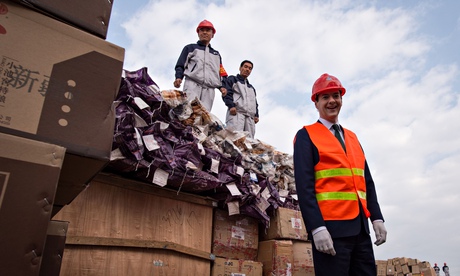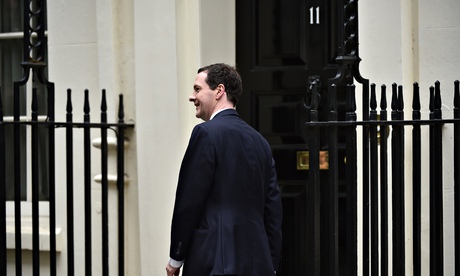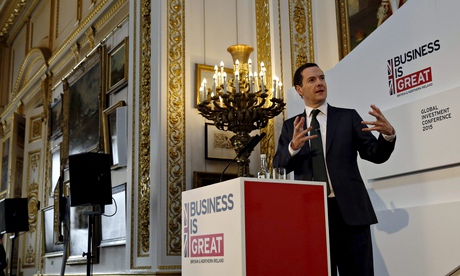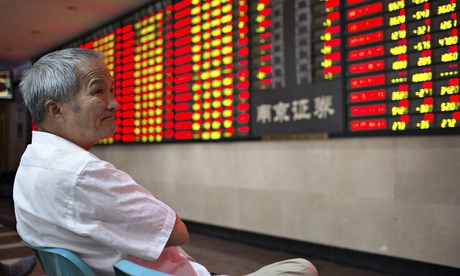Chinese hard hats are red, we discovered last week. George Osborne, never slow to slip into industrial workwear, had several opportunities to model one during his five-day-long grand tour, as he gladhanded officials, chatted to workers, and urged Chinese firms to help build Britain’s “northern powerhouse”.
The chancellor’s Chinese jaunt, on which an extraordinary six other ministers joined him at various points, was part of a concerted strategy to paint himself as a forward-thinking free trader at ease on the world stage – and, of course, to suck up to the Chinese authorities.
“We are truly entering a golden era of cooperation between our two countries, and it’s crucial that businesses and communities from across the UK feel the full benefit of forging closer economic links with China,” he gushed.
The feeling appeared to be mutual: the Global Times, a newspaper close to the Chinese state, later praised his “diplomatic etiquette” in not raising “the human rights issue”. “Keeping a modest manner is the correct attitude for a foreign minister visiting China to seek business opportunities,” it said.
And by inviting the Chinese to come and build a new nuclear facility in Essex – and providing £2bn in taxpayer guarantees to underpin the Hinkley project – Osborne appeared willing to set aside not just human rights concerns but safety, national security and even a basic cost-benefit analysis in exchange for the hand of Chinese friendship.
We appear to be witnessing the O’Neill-isation of economic policy. The chancellor’s new commercial secretary, Lord (Jim) O’Neill of Gatley, the former Goldman Sachs chief economist who accompanied him last week, has two longstanding obsessions – the rise and rise of the Chinese economy, and the creation of a northern powerhouse.
Throwing open a “northern pitchbook” of £24bn in investment opportunities to Chinese firms last week married the two. Indeed, donating £3m of taxpayers’ cash to train aspiring young Chinese footballers catered for O’Neill’s third great enthusiasm: the beautiful game.
And perhaps there’s nothing wrong with deepening cultural and commercial ties with a rising global power. Yet even for the most hard-nosed defender of the argument that commercial considerations should trump ethical qualms, the chancellor’s timing last week looked distinctly odd.
The days when China’s ascent to global economic hegemony appeared assured, its appetite for exports insatiable, are long gone. Instead, Chinese influence on today’s global economy is making itself felt through a domino-tumble of devaluations, layoffs and recessions that stretches from Russia to Brazil to South Africa (all members, along with India, of the “Brics” group of emerging countries: an acronym coined by O’Neill).
World trade is shrinking as China’s demand for resources wanes; global commodity prices have plunged; emerging market currencies are being hammered. Last week alone, the South African rand, the Brazilian real and the Turkish lira all hit record lows against the dollar.
The notion of “decoupling”, fashionable in the wake of the 2008-09 crisis, under which China and the other major emerging markets would continue to drive global growth even as the US and Europe stalled, now looks defunct.
In fact, China bought its continued economic resilience in recent years at the expense of a credit-fuelled boom in infrastructure projects, which has left a legacy of bad loans and swings in property markets. Now the authorities are struggling to manage the transition from an export-dominated economy towards a “new normal” of steadier, services-led growth, while coping with the consequences of the credit bubble.
The recent decision to devalue the yuan in the summer, albeit by a relatively modest 4% or so, suggested they may have decided growth is slowing more sharply than they are willing to tolerate. Many analysts believe they will do it again in the coming months. As Citigroup’s Willem Buiter puts it, China is “a messy market economy of the state-capitalist/crony-capitalist variety, where policy ambitions are not matched with effective policy instruments and where macroeconomic management and financial crisis prevention and mitigation competence are in short supply”.
And in today’s interconnected global economy, China’s problems quickly become everyone else’s problems too. The 10,000 layoffs announced last week by US manufacturer Caterpillar, whose giant trucks are used in mining, appeared to be an early sign that the consequences of waning Chinese demand are rippling out from the commodities sector into industry.
Janet Yellen, the Federal Reserve chair, made clear that the US’s decision not to press ahead with a widely telegraphed plan to raise interest rates in September had its roots in the turmoil in China. In effect, the Fed was acknowledging that China’s economy is too fragile to withstand higher American rates. Or, to put it another way, China’s downturn is doing some of the Fed’s work for it – bearing down on inflation, not just in the US but in scores of countries worldwide.
And that includes Britain. China’s biggest export these days is not plastic toys or iPhone parts: it’s deflation, and the victims are already piling up.
It’s hard to feel much sympathy for the billionaire bosses of commodities trader Glencore, who have seen their fortunes chipped away by the crashing price of raw materials. But as Osborne was settling himself in to the window seat on another Chinese high-speed train last week, Britain’s steelmakers were gathering in London to warn the government that, without being given “half a chance”, they would be forced to shut down plants and lay off thousands of workers, as they struggle to cope with what they see as the dumping of cut-price Chinese steel on the world market.
Osborne may believe he is playing a canny diplomatic game, calculating that closeness to the Chinese will pay off; but his enthusiasm for selling Britain by the yuan may yet come to look ill-judged.











